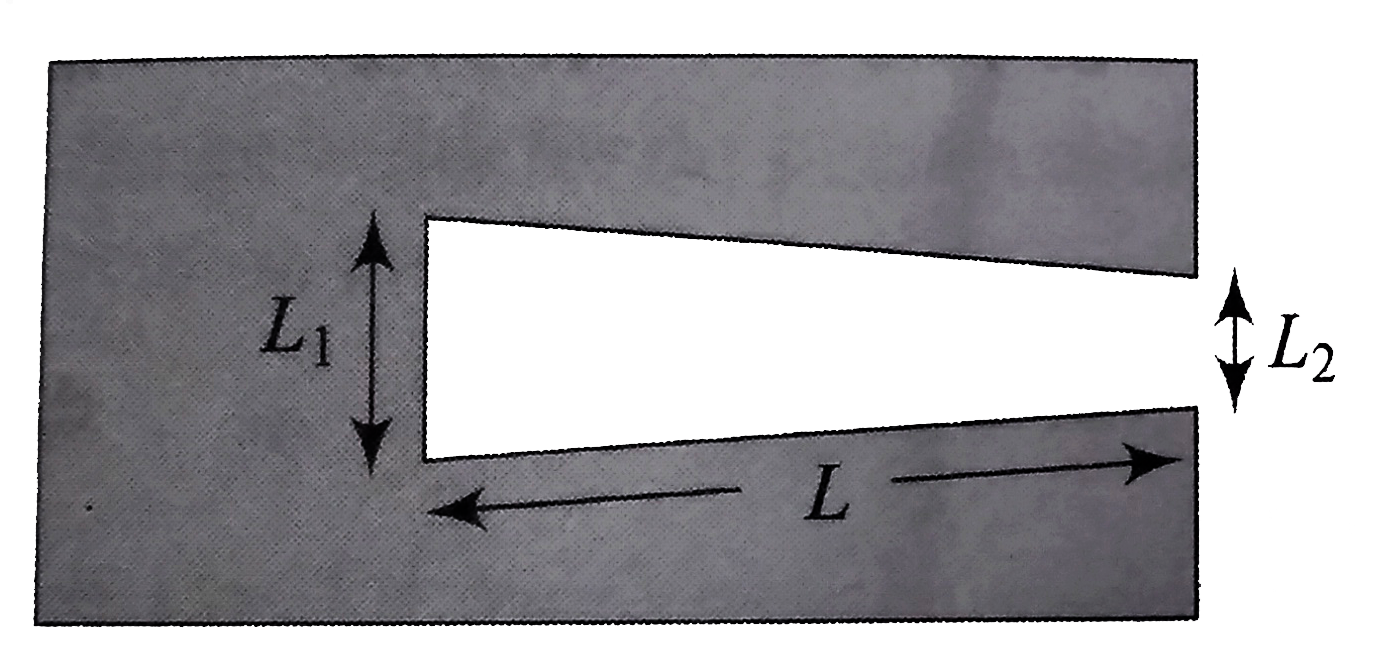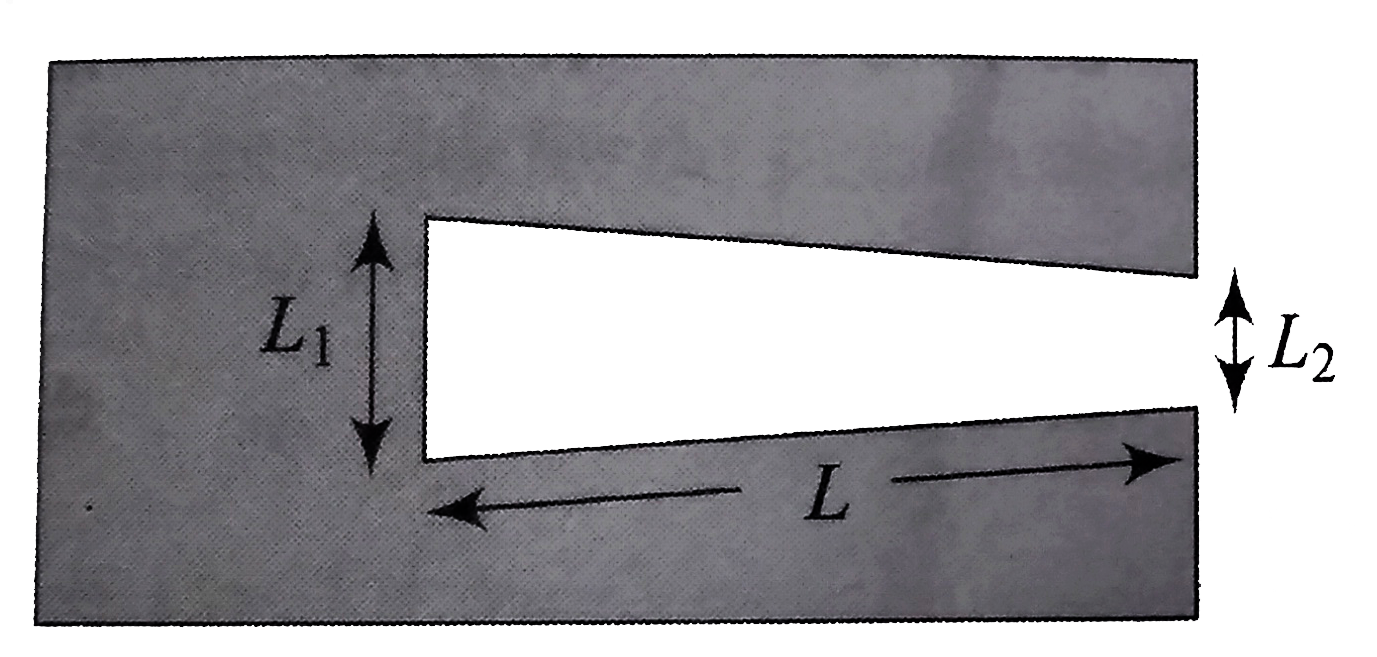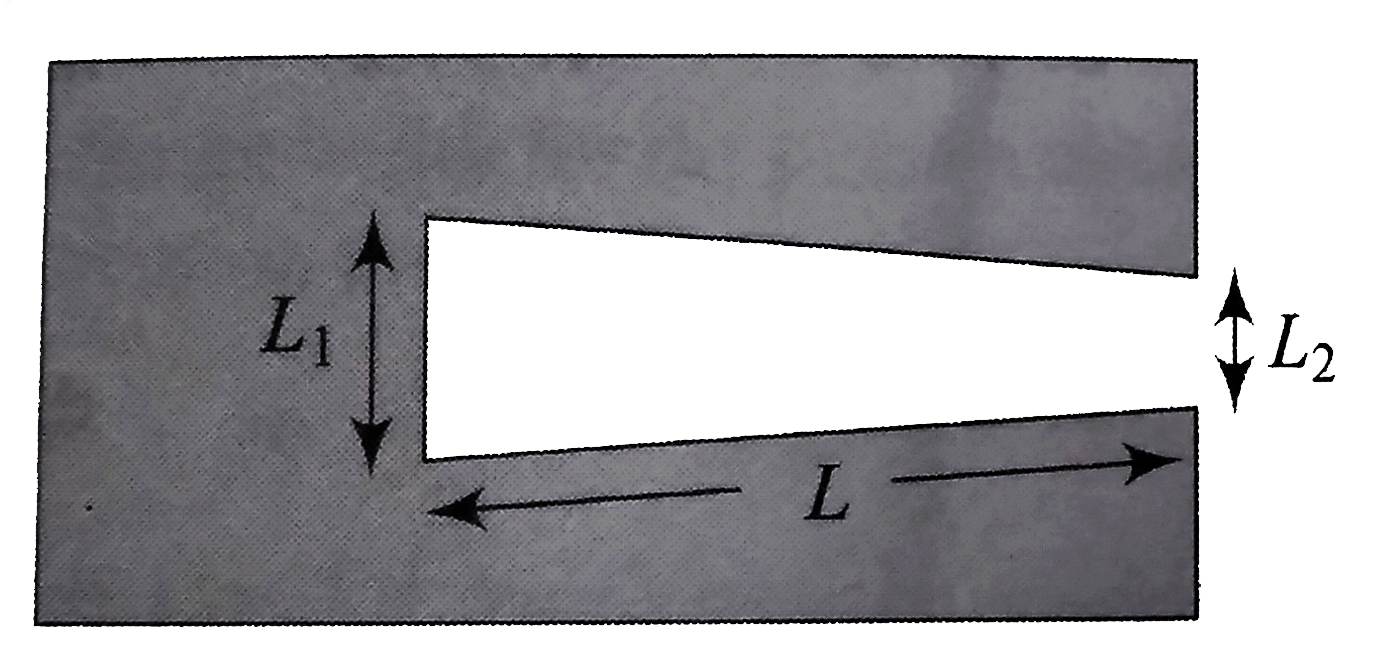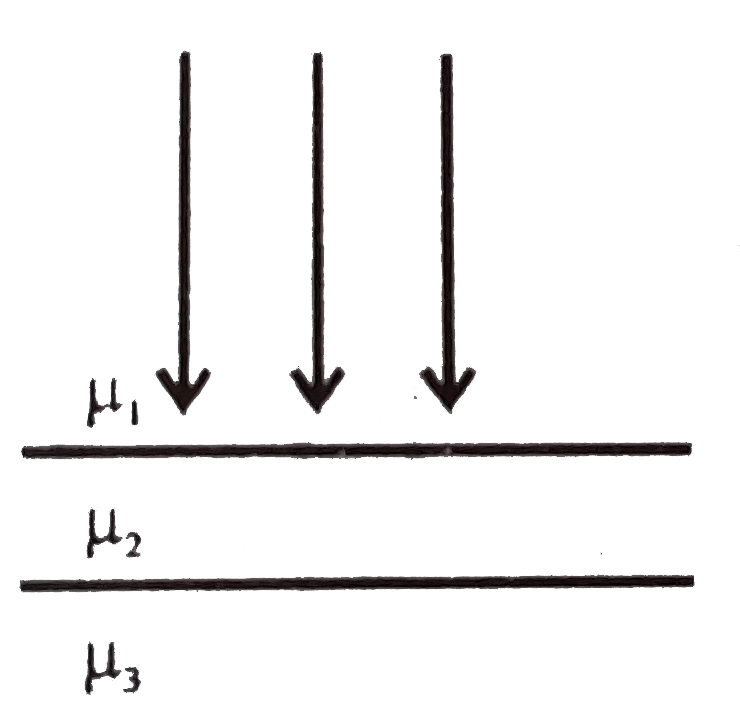A block o plastic having a thin air cavity (whose thickenss is comparable to wavelength of light waves) is shown in fig. The thickness of air cavity (which can be considered as air wedge for interference pattern) is varying linearly from one end to other as shown.
A broad beam of monochromatic light is incident normally from the top of the plastic box. Some ligth lis reflected back above and below the cavity .The plastic layers than wavelength of incident light . An observer when looking down from top sees an interference pattern consisting of eight dark fringes and seven bright fringe along the wedge. Take wavelength of incident light in air as λ0 and refractive index of plastic as μ
Assume that the thickness of the ends of air cavity are such that formation of fringe takes place there.

Determine the distance of 4th dark fringe from the left end of air cavity.
2L6+λ0
L1+3L4
4L7
5L7
The correct Answer is:c
For 4th dark fringe from left end,
2μt=(n−3)λ0
2μ(L2+L1−L2Lx)=2μL1−3λ0
x=4L7
Topper's Solved these Questions
- WAVE OPTICSBook:CENGAGE PHYSICSChapter:WAVE OPTICSExercise:Integer
Explore 3 Videos
- WAVE OPTICSBook:CENGAGE PHYSICSChapter:WAVE OPTICSExercise:Archives
Explore 4 Videos
- WAVE OPTICSBook:CENGAGE PHYSICSChapter:WAVE OPTICSExercise:Assertion- Reasoning
Explore 13 Videos
- THERMODYNAMICSBook:CENGAGE PHYSICSChapter:THERMODYNAMICSExercise:QUESTION BANK
Explore 34 Videos
- WAVESBook:CENGAGE PHYSICSChapter:WAVESExercise:QUESTION BANK
Explore 38 Videos
Similar Questions
The wavelength of yellow light in vacuum is 6000 Å. If the absolute refractive index of air is 1.0002, then calculate the thickness of air column which will have one more wavelength of yellow light than in the same thickness of vacuum.
View SolutionFind the wavelength, frequency and speed of refracted light if it is incident from air to a glass surface. Wavelength of light is 590 nm and refractive index of glass is 1.5.
View Solution
Knowledge Check
A block o plastic having a thin air cavity (whose thickenss is comparable to wavelength of light waves) is shown in fig. The thickness of air cavity (which can be considered as air wedge for interference pattern) is varying linearly from one end to other as shown.
A broad beam of monochromatic light is incident normally from the top of the plastic box. Some ligth lis reflected back above and below the cavity .The plastic layers than wavelength of incident light . An observer when looking down from top sees an interference pattern consisting of eight dark fringes and seven bright fringe along the wedge. Take wavelength of incident light in air as λ0 and refractive index of plastic as μ
Assume that the thickness of the ends of air cavity are such that formation of fringe takes place there.

Determine the separation between 1st and 2nd dark fringes form the left end of air cavityA3L7+2λ0μB5L7C4L7D6L7A block o plastic having a thin air cavity (whose thickenss is comparable to wavelength of light waves) is shown in fig. The thickness of air cavity (which can be considered as air wedge for interference pattern) is varying linearly from one end to other as shown.
A broad beam of monochromatic light is incident normally from the top of the plastic box. Some ligth lis reflected back above and below the cavity .The plastic layers than wavelength of incident light . An observer when looking down from top sees an interference pattern consisting of eight dark fringes and seven bright fringe along the wedge. Take wavelength of incident light in air as λ0 and refractive index of plastic as μ
Assume that the thickness of the ends of air cavity are such that formation of fringe takes place there.

Determine of difference L1−L2=ΔL) in terms of λ0.A4λ0μB7λ02μC3λ0μDNone of the aboveMonochromatic light is refracted from air into the glass of refractive index μ . The ratio of the wavelength of incident and refracted waves is
A1:μB1:μ2Cμ:1D1:1
Monochromatic light is refracted from air into the glass of refractive index μ . The ratio of the wavelength of incident and refracted waves is
View SolutionMonochromatice light is refracted from air into glass of refractive index μ. The ratio of the wavelength of the incident and refracted waves in
View SolutionA parallel beam of monochromatic light is incident on a glass slab at an angle of 35∘. The ratio of width of beam in glass to that in air is [ μg=1.5]
View SolutionConsider a case of thin film interference as shown.Thickness of film is equal to wavelength of light in μ2

View SolutionAir cavities in the bone are found in
View Solution

